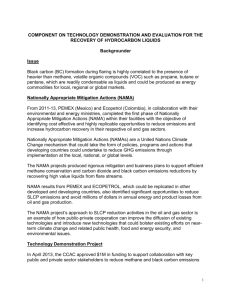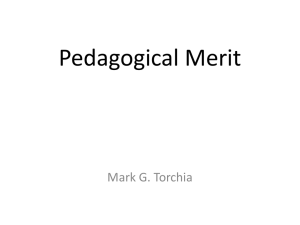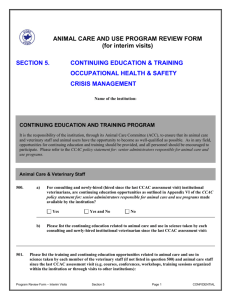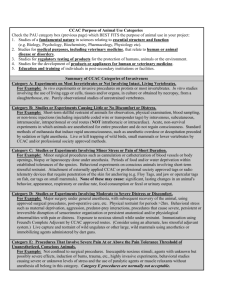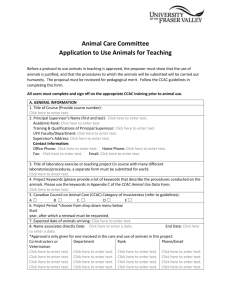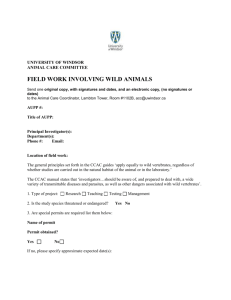wg_01 - The Renewable Energy Programme, Nigeria
advertisement
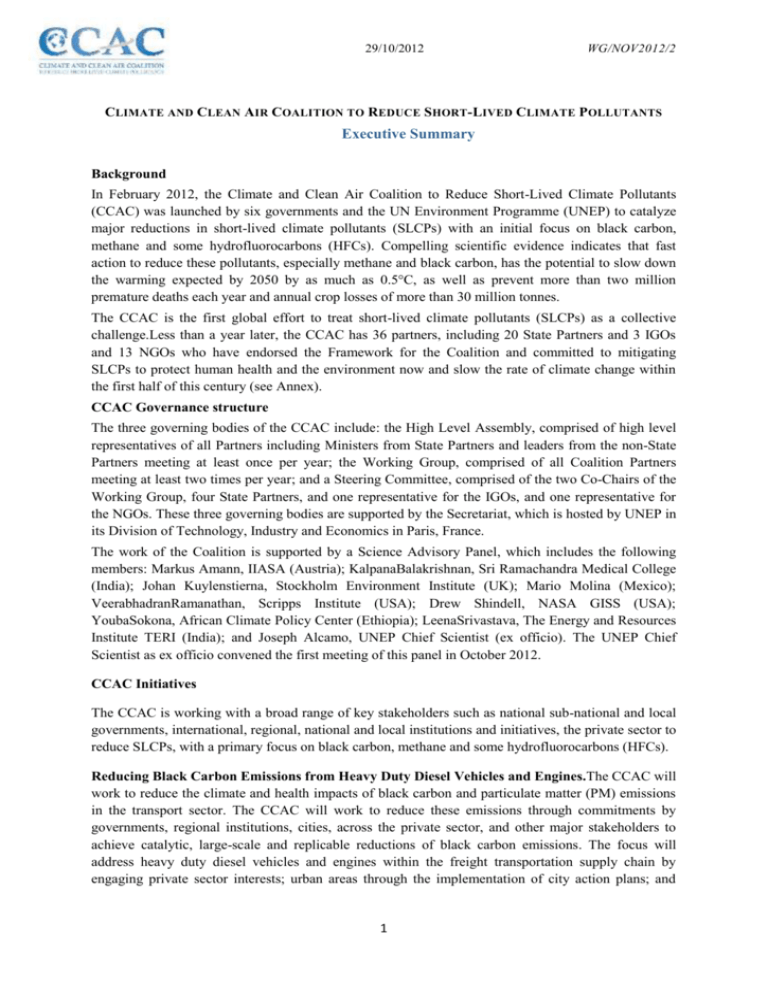
29/10/2012 WG/NOV2012/2 CLIMATE AND CLEAN AIR COALITION TO REDUCE SHORT-LIVED CLIMATE P OLLUTANTS Executive Summary Background In February 2012, the Climate and Clean Air Coalition to Reduce Short-Lived Climate Pollutants (CCAC) was launched by six governments and the UN Environment Programme (UNEP) to catalyze major reductions in short-lived climate pollutants (SLCPs) with an initial focus on black carbon, methane and some hydrofluorocarbons (HFCs). Compelling scientific evidence indicates that fast action to reduce these pollutants, especially methane and black carbon, has the potential to slow down the warming expected by 2050 by as much as 0.5°C, as well as prevent more than two million premature deaths each year and annual crop losses of more than 30 million tonnes. The CCAC is the first global effort to treat short-lived climate pollutants (SLCPs) as a collective challenge.Less than a year later, the CCAC has 36 partners, including 20 State Partners and 3 IGOs and 13 NGOs who have endorsed the Framework for the Coalition and committed to mitigating SLCPs to protect human health and the environment now and slow the rate of climate change within the first half of this century (see Annex). CCAC Governance structure The three governing bodies of the CCAC include: the High Level Assembly, comprised of high level representatives of all Partners including Ministers from State Partners and leaders from the non-State Partners meeting at least once per year; the Working Group, comprised of all Coalition Partners meeting at least two times per year; and a Steering Committee, comprised of the two Co-Chairs of the Working Group, four State Partners, and one representative for the IGOs, and one representative for the NGOs. These three governing bodies are supported by the Secretariat, which is hosted by UNEP in its Division of Technology, Industry and Economics in Paris, France. The work of the Coalition is supported by a Science Advisory Panel, which includes the following members: Markus Amann, IIASA (Austria); KalpanaBalakrishnan, Sri Ramachandra Medical College (India); Johan Kuylenstierna, Stockholm Environment Institute (UK); Mario Molina (Mexico); VeerabhadranRamanathan, Scripps Institute (USA); Drew Shindell, NASA GISS (USA); YoubaSokona, African Climate Policy Center (Ethiopia); LeenaSrivastava, The Energy and Resources Institute TERI (India); and Joseph Alcamo, UNEP Chief Scientist (ex officio). The UNEP Chief Scientist as ex officio convened the first meeting of this panel in October 2012. CCAC Initiatives The CCAC is working with a broad range of key stakeholders such as national sub-national and local governments, international, regional, national and local institutions and initiatives, the private sector to reduce SLCPs, with a primary focus on black carbon, methane and some hydrofluorocarbons (HFCs). Reducing Black Carbon Emissions from Heavy Duty Diesel Vehicles and Engines.The CCAC will work to reduce the climate and health impacts of black carbon and particulate matter (PM) emissions in the transport sector. The CCAC will work to reduce these emissions through commitments by governments, regional institutions, cities, across the private sector, and other major stakeholders to achieve catalytic, large-scale and replicable reductions of black carbon emissions. The focus will address heavy duty diesel vehicles and engines within the freight transportation supply chain by engaging private sector interests; urban areas through the implementation of city action plans; and 1 29/10/2012 WG/NOV2012/2 countries through the adoption of a range of measures for reducing sulphur in fuels and vehicle emissions. In a first phase to be completed early in 2013, the CCAC will focus its work on the reduction of diesel PM/black carbon emissions from heavy duty vehicles in Latin America and Asia through the introduction of low sulfur diesel fuels and the adoption of vehicles emissions standards for heavy duty vehicles at the city, national and regional levels.These activities are led by the UN Environment Programme and the United States in collaboration with a number of other Coalition Partners. Mitigating SLCPs and Other Pollutants from Brick Production.The CCAC is working to reduce SLCPs and other pollutants from brick production. Brick production has been identified as an important area where substantial emission reductions can be made for black carbon and other pollutants, including toxics. Brick production is an ancient activity that took place in most parts of the world. Although brick production in the developed world has decreased over the past decades, it has also gone through modernization. In contrast, as urbanization in developing countries has grown in recent years, modernization has not necessarily reached the brick-making/production sector. Cleaner brick production alternatives exist, including mechanized and high-energy efficient technologies. In addition, there are a number of integrated approaches to address this complex problem involving not only environmental but social and economic issues. Mexico is leading this effort to place the issue of SLCP emissions from inefficient brick production onto national governments’ agendas to catalyze political engagement and action. The first phase of the initiative focuses on awareness raising and capacity building in Latin America, Africa and Asia. An expert task force has been convened to guide the work of this initiative. The first workshop on public policies to mitigate the impacts from brick production took place on 4-6 September 2012 in Guanajuato, Mexico. Mitigating SLCPs from Landfills and Municipal Solid Waste.The CCAC is working to address methane, black carbon, and other air pollutants emissions across the municipal solid waste sector by working with cities and national governments. This initiative will be a catalysing force to reduce methane and air pollution across the municipal solid waste sector by securing city and country commitments to undertake a variety of best practice policies and strategies for waste management. The initiative was successfully launched at the Rio+20 UN Conference on Sustainable Development in June 2012. In a first phase of activities, the CCAC will support a number of cities to develop strategies for reducing SLCPs from waste and build a knowledge network for sharing best practices in cities around the world. These activities are led by Canada, Mexico, the United States, the UN Environment Programme and the World Bank in collaboration with a number of other Partners. Promoting HFC Alternative Technology and Standards.The CCAC will promote HFC alternative technology and standards, including through activities, such as, developing sector-specific HFC inventories, demonstrations of HFC alternatives, information dissemination and capacity building through key networks, and leveraging government procurement policies. The CCAC will work to bring high-level visibility to HFC reduction efforts, and facilitate dialogue with industry leaders who are committed to responsible approaches or who can contribute in areas of technology development, commercialization and deployment. In a first phase of activities, the CCAC will support the development of HFC inventories in a number of developing countries, organize a Commercial Refrigeration technology Forum in Montreal on December 8, 2012, support the production of case studies and dissemination of information on low2 29/10/2012 WG/NOV2012/2 GWP options for specific subsectors. As part of its first actions, the CCAC supported the “Advancing Ozone and Climate Protection Technologies: Next Steps Conference” which took place from 21-22 July in Bangkok.These activities are led by the U.S. in collaboration with many other Partners. Accelerating Methane and Black Carbon Reductions from Oil and Natural Gas Production.The CCACis working with a group of key stakeholders and countries in the oil and natural gas sector to encourage cooperation and support the implementation of new and existing measures to substantially reduce SLCP emissions from natural gas venting, leakage, and flaring.The initiative will build on existing programs and work with participating governments, companies, financial institutions, and other stakeholders to more fully capture and utilize vented, leaked, and flared natural gas through cost effective strategies. The oil and gas sector accounts for more than 20% of all anthropogenic emissions of methane globally.Nigeria and the United States are leading this initiative. Promoting SLCP National Action Planning (NAP).The CCAC will work with interested national governments to support the rapid roll-out of national action planning (NAP) for SLCP mitigation.The rapid development of NAP will enable countries to identify achievable ‘quick-win’ benefits, and to prepare the ground for large-scale implementation of mitigation measures geared to their unique national circumstances, priorities and particular mix of SLCP sources. In the pilot phase, the CCAC will engage with four developing countries in Asia, Latin America, namely Bangladesh, Colombia, Ghana and Mexico to support the rapid development of national action planning. More countries will be supported in subsequent phases.A national action planning guide and a rapid emissions and scenarios assessment toolkit to determine current emissions, emission scenarios and support rapid benefit estimation will also be developed for voluntary use by governments.These activities are led by Mexico, UNEP, the Stockholm Environment Institute and the Molina Center for Strategic Studies in Energy and the Environment. Financing Mitigation of SLCPs.While multiple means of financing SLCP mitigation already exist, they are not currently translating into high-enough levels of financial flows. In order to take advantage of all mitigation opportunities,are the CCAC aims to scale-up SLCP mitigation financing and will work with governments, the private sector, donors, financial institutions, expert groups and investors’ networks to address current knowledge gaps, barriers to financing and implementation of SLCP reduction projects and identify existing and potential avenues and mechanisms to bolster financial flows toward SLCP reduction activities at the national and international scales.UNEP-Finance Initiative and the World Bank are leading this initiative in collaboration with a number of other Partners. Funding of the CCAC Approximately US$ 14 million has been pledged to the Coalition Trust Fund, of which approximately US$6.2 million has been deposited and funding activities under the initiatives. Contact information Secretariat Climate and Clean Air Coalition to Reduce Short-Lived Climate Pollutants (CCAC) United Nations Environment Programme 15 rue de Milan 75441 Paris Cedex 09, France Tel: +33 (0) 1 44 37 14 50 www.unep.org/ccac ccac_secretariat@unep.org 3 29/10/2012 WG/NOV2012/2 ANNEX CCAC Partners (as of 29 October 2012) State and REIO Partners (20) Australia Bangladesh Canada Colombia Denmark EuropeanCommission Finland France Germany Ghana Israel Italy Japan Jordan Mexico Nigeria Norway Sweden United Kingdom United States Non-State Partners (16) Intergovernmental organizations (3) UN Development Programme (UNDP) UN Environment Programme (UNEP) World Bank Non-governmental organizations (13) Bellona Foundation Clean Air Initiative for Asian Cities (CAI-Asia) Clean Air Task Force ClimateWorks Foundation Earthjustice Environmental Defense Fund (EDF) Global Alliance for Clean Cookstoves Institute for Governance and Sustainable Development (IGSD) International Council on Clean Transportation (ICCT) International Cryosphere Climate Initiative (ICCI) International Union of Air Pollution Prevention and Environmental Protection Associations (IUAPPA) Molina Center for Strategic Studies in Energy and the Environment Stockholm Environment Institute (SEI) 4
